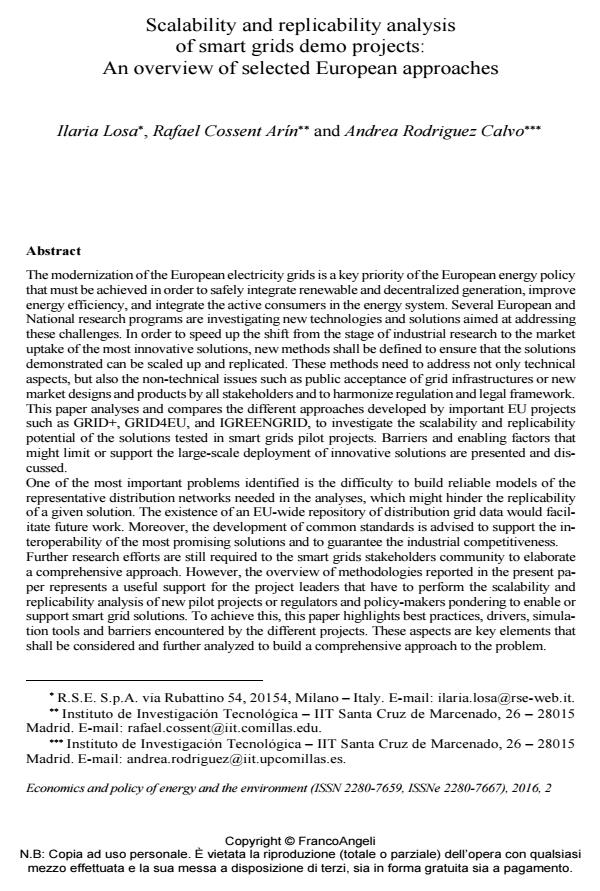Scalability and replicability analysis of smart grids demo projects: An overview of selected European approaches
Titolo Rivista ECONOMICS AND POLICY OF ENERGY AND THE ENVIRONMENT
Autori/Curatori Ilaria Losa, Rafael Cossent Arín, Andrea Rodriguez Calvo
Anno di pubblicazione 2017 Fascicolo 2016/2
Lingua Inglese Numero pagine 28 P. 53-80 Dimensione file 559 KB
DOI 10.3280/EFE2016-002004
Il DOI è il codice a barre della proprietà intellettuale: per saperne di più
clicca qui
Qui sotto puoi vedere in anteprima la prima pagina di questo articolo.
Se questo articolo ti interessa, lo puoi acquistare (e scaricare in formato pdf) seguendo le facili indicazioni per acquistare il download credit. Acquista Download Credits per scaricare questo Articolo in formato PDF

FrancoAngeli è membro della Publishers International Linking Association, Inc (PILA), associazione indipendente e non profit per facilitare (attraverso i servizi tecnologici implementati da CrossRef.org) l’accesso degli studiosi ai contenuti digitali nelle pubblicazioni professionali e scientifiche.
The modernization of the European electricity grids is a key priority of the European energy policy that must be achieved in order to safely integrate renewable and decentralized generation, improve energy efficiency, and integrate the active consumers in the energy system. Several European and National research programs are investigating new technologies and solutions aimed at addressing these challenges. In order to speed up the shift from the stage of industrial research to the market uptake of the most innovative solutions, new methods shall be defined to ensure that the solutions demonstrated can be scaled up and replicated. These methods need to address not only technical aspects, but also the non-technical issues such as public acceptance of grid infrastructures or new market designs and products by all stakeholders and to harmonize regulation and legal framework. This paper analyses and compares the different approaches developed by important EU projects such as GRID+, GRID4EU, and IGREENGRID, to investigate the scalability and replicability potential of the solutions tested in smart grids pilot projects. Barriers and enabling factors that might limit or support the large-scale deployment of innovative solutions are presented and discussed. One of the most important problems identified is the difficulty to build reliable models of the representative distribution networks needed in the analyses, which might hinder the replicability of a given solution. The existence of an EU-wide repository of distribution grid data would facilitate future work. Moreover, the development of common standards is advised to support the interoperability of the most promising solutions and to guarantee the industrial competitiveness. Further research efforts are still required to the smart grids stakeholders community to elaborate a comprehensive approach. However, the overview of methodologies reported in the present paper represents a useful support for the project leaders that have to perform the scalability and replicability analysis of new pilot projects or regulators and policy-makers pondering to enable or support smart grid solutions. To achieve this, this paper highlights best practices, drivers, simulation tools and barriers encountered by the different projects. These aspects are key elements that shall be considered and further analyzed to build a comprehensive approach to the problem.
Parole chiave:Scalability, replicability, smart grids, power system regulations, distribution grids
Jel codes:L94, L50
- 2025 IEEE International Smart Cities Conference (ISC2) Andrei Morch, Raymundo E. Torres Olguin, pp.1 (DOI:10.1109/ISC266238.2025.11293257)
- Methodology for evaluating the replicability of European energy solutions in global contexts Ilaria Losa, Andreas Corusa, in ECONOMICS AND POLICY OF ENERGY AND THE ENVIRONMENT 2/2024 pp.87
DOI: 10.3280/EFE2024-002005
Ilaria Losa, Rafael Cossent Arín, Andrea Rodriguez Calvo, Scalability and replicability analysis of smart grids demo projects: An overview of selected European approaches in "ECONOMICS AND POLICY OF ENERGY AND THE ENVIRONMENT" 2/2016, pp 53-80, DOI: 10.3280/EFE2016-002004